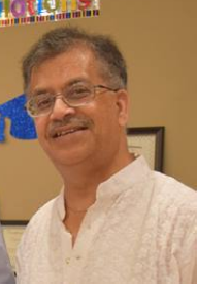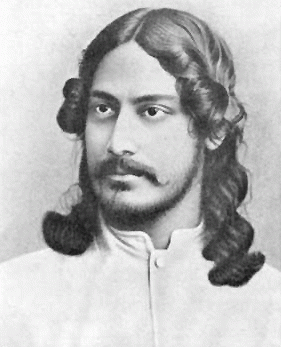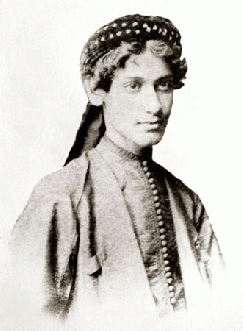Rabindranath Tagore's Ode to Dawn
(Prabhat Utsav)
Rabindranath Tagore
From Prabhat Sangeet (1883)
Preface: (Monish R. Chatterjee)
Poet and visionary Rabindranath Tagore (1861-1941)'s impending emergence into a lifetime of creativity and timeless thought was already evident very early in life through such works as Bhanusimha Thakurer Padavali (1884), written when he was in his early 20s. These stylized bhakti poems were written in the Brajabuli dialect (entirely different from Tagore's own Bengali which he completely revolutionized in the years that followed) with such inimitable and consummate skill that it is believed that many classical scholars of that time firmly believed that these were newly excavated classical works by an unknown writer from the medieval age. Little did they know that these were the handiwork of a young upstart from the affluent and culturally vibrant Tagore household.
The early 1880s held multiple moments of inner awakening within the young Rabindranath. Not the least of these was the momentous epiphany experienced on almost consecutive dawns in two separate places- an epiphany which was clearly transformative for an epoch-making genius who would bring the Bengal Renaissance to its very pinnacle. The first of these occurred one early dawn on the verandah of the sprawling Tagore homestead in Jorasanko in Calcutta. The second, which had even more lasting impact, occurred not a long time after the first (around 1882). This happened during a brief period around 1882 when Rabindranath went to live with his immediate older brother, Jyotirindranath and his wife, Tagore's beloved bouthan, Kadambari. At the time, Jyotirindranath lived at 10 Sudder Street, a house in central Calcutta which has since become a relic of national importance in Calcutta's cultural life. This translator himself had long wished to visit this historic house many years later, and in fact fulfilled his long-nurtured wish only after he had completed his graduate studies in the U.S.. Visiting 10, Sudder Street and attempting to re-live generated within his mind a special sensation of being in the very place and moment at the site where Tagore, the greatest inspiration by far in his life had once written the transformational poem, Nirjharer Swapnabhanga (The Awakening of the Waterfall (also its variance, Cataract)). Visiting the place, however, this translator found the historic building under serious disrepair, and its ground floor occupied by a computer training center. On the wall of the entrance porch he did discover an old marble tablet which proclaimed the source of the momentous importance of the building- being the place where The Awakening was first written. As is characteristic of much of Calcutta, Bengal and indeed India- places of great historic importance and moment are frequently greatly neglected and sometimes even forgotten in the years that follow. This was but one instance of such oblivion.
For context, let me quote here directly the following passage in Tagore's own words taken from his memoir, Jivansmriti (My Reminiscences) in which he lays out in some detail the circumstances relating to, and the great life-changing awakening at dawn which eventually led to his Universalist philosophy.
"(From Jivansmriti)
""..
Ch. 34: Morning Songs
At the river-side I also did a bit of prose writing, not on any definite subject or plan, but in the spirit that boys catch butterflies. When spring comes within, many-coloured short-lived fancies are born and flit about in the mind, ordinarily unnoticed. In these days of my leisure, it was perhaps the mere whim to collect them which had come upon me. Or it may have been only another phase of my emancipated self which had thrown out its chest and decided to write just as it pleased; what I wrote not being the object, it being sufficient unto itself that it was I who wrote. These prose pieces were published later under the name of Vividha Prabandha, Various Topics, but they expired with the first edition and did not get a fresh lease of life in a second.
At this time, I think, I also began my first novel, Bauthakuranir Hat.
After we had stayed for a time by the river, my brother Jyotirindra took a house in Calcutta, on Sudder Street near the Museum. I remained with him. While I went on here with the novel and the Evening Songs, a momentous revolution of some kind came about within me.
One day, late in the afternoon, I was pacing the terrace of our Jorasanko house. The glow of the sunset combined with the wan twilight in a way which seemed to give the approaching evening a specially wonderful attractiveness for me. Even the walls of the adjoining house seemed to grow beautiful. Is this uplifting of the cover of triviality from the everyday world, I wondered, due to some magic in the evening light? Never!
Next Page 1 | 2 | 3 | 4 | 5 | 6 | 7 | 8
(Note: You can view every article as one long page if you sign up as an Advocate Member, or higher).







